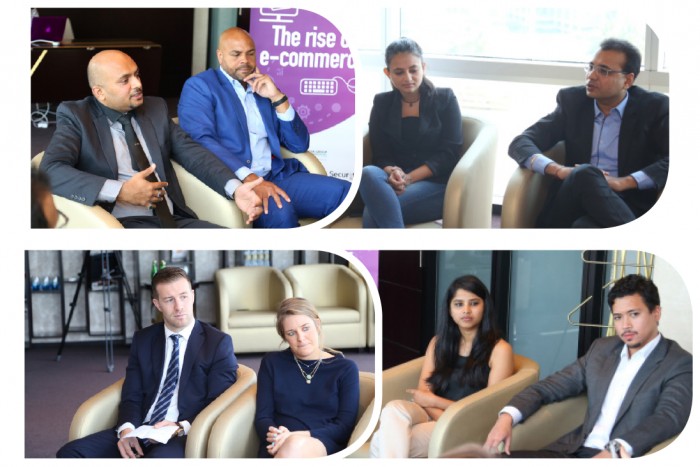Reseller Middle East recently hosted Your Voice with Tahawul Tech’s second edition. Held at the Jumeirah Emirates Towers, the second outing of the series gathered e-commerce and retail specialists to look into the rapidly expanding and promising e-commerce industry in the region.

From ride-hailing to ordering food, from buying the latest gadgets to purchasing pre-owned items, the comfort of being able to acquire an item or a service is increasingly becoming a lifestyle across the globe.
According to a report by eMarketer, worldwide business-to-consumer (B2C) e-commerce sales is expected to increase hit a whopping $1.5 trillion, which proves the scale and reach of this fast-expanding industry. In the GCC alone, the e-commerce market is expected to reach $20 billion in the next three years, prompted by a surging consumer base, high disposable incomes and changing buying habits, among other factors.
What’s more is that new developments such as the recent entry of Amazon.com in the region and the imminent opening of Emaar Properties’ Mohamed Alabbar’s Noon.com are further fuelling the e-commerce bandwagon.
“These activities definitely mark a huge turning point for the regional e-commerce space,” said Sarah Jones, founder and CEO, Sprii.com. “Furthermore, the arrival of a global leader like Amazon.com will definitely put us on the map as a strong e-commerce market for both consumers and investors.”
However, even with the huge interest and vast opportunities surrounding this rising sector, it is not without any challenges. In a market dominated by popular brick-and-mortar stores and big shopping festivals, how far can e-commerce go?
“Offline retail is strong in this part of the world,” said Mahesh Chotrani, assistant VP, Jacky’s Electronics. “The reason behind this is the mall culture cultivated in the region and the presence of big shopping promotions like Dubai Summer Festival, Dubai Summer Surprises, GITEX and so on, are continuously drawing consumers to physical shops rather than online.”
He added, “I doubt that online will surpass brick-and-mortar stores any time soon. But I believe that a combination of online and offline retail will be a very promising model for regional retail players.”
Adveta Dwivedi, head, Digital Marketing Strategy, Whoopey.com, agreed, and said that for a retail brand to succeed in this region they cannot just operate online or offline alone. “I think retail players are increasingly becoming aware of this,” she said. “We can see that most brands who only initially have offline business are moving towards building their online presence and online retailers are looking at having an omnichannel strategy to have a wider coverage.”
However, for pure play companies like Sprii.com, Jones said she believes that having a physical presence or even owning a warehouse for stocking items is just not ideal. “The drop-ship approach has always been a more effective model for pure play stores like us,” she said. “We’ve seen that a number of e-commerce players who have had their own physical space to store products have struggled when it comes to profitability. Taking inventory is quite an issue for e-commerce players due to the extra costs.”
Among the other challenges discussed by the panellists are the security concerns that consumers typically have, chief among which, is online payments.
“Even though the region has a high growth trend of Internet usage, consumers are sceptical when it comes to making online payment when purchasing a product,” said Venkat Reddy, COO, District 360. “Most people still opt to pay via cash on delivery. This emphasises the issues of security and trust that regional consumers have.”
He added that people tend to have trust and security issues when putting their financial credentials online. “With well-established brands like Amazon coming into the picture, I believe that e-commerce consumers will be more receptive of online payments and the trust level will go up,” he said. “But we need to continue working on new ways to ensure that the data of our customers are secure.”
Moving on, the panellists delved into how pure play or hybrid e-commerce companies bring better customer experiences to ensure success. To this, all agreed that ‘personalisation’ is key.
“There’s this notion in the industry that e-commerce is focused on automation,” said Alex Tchablakian, operations manager, Letstango.com. “However, a human touch is still very important even for online businesses. Consumers expect some level of ‘personalised’ experience such as assistance pre-, during and post-transactions. The use of platforms like WhatsApp, Twitter and so on also present opportunities for online players to give their customers a personal touch.”
Steve Currie, general manager, Taskgate, said that online players should not rely purely on technology when it comes to customer satisfaction. “For us specifically, our focus is on recruitment and we utilise a variety of technologies in our operations,” he explained. “I believe there is no technology out there that can perfectly match a person to a certain job. That means a certain level of human element needs to be integrated into our processes for it to be successful and the I believe the same goes with e-commerce.”
Throughout the discussions, it has been highlighted that apart from security and customer experience, speed of delivery is also an important aspect that e-commerce players need to look into. This is instrumental in ensuring the consumers’ loyalty to the marketplace or brand and will increase purchase conversion while limiting cancellations.
It is clear that the e-commerce industry holds many opportunities for various retail brands inside and outside the region. While the systems and processes around it are still not perfect we can expect that it will continue to evolve and disrupt the way we sell and purchase goods and services.





